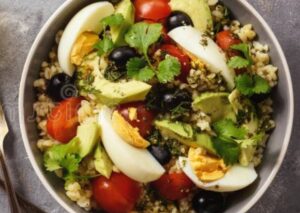When it comes to managing obesity, everyone talks about “eating less.” But what often gets lost in the noise is something even more critical: eating better. The quality of what you eat can be just as important—if not more so—than the quantity. High-quality nutrition fuels your body, balances your hormones, curbs cravings, and supports long-term weight management. And contrary to what some believe, eating well doesn’t have to mean emptying your wallet at a gourmet health store.
Not All Calories Are Created Equal
A 100-calorie apple and a 100-calorie bag of chips are not equal. One delivers fiber, water, vitamins, and natural sugars. The other delivers salt, preservatives, and highly processed oils. Your body knows the difference.
When you feed your body high-quality foods—things like fresh vegetables, fruits, whole grains, lean proteins, legumes, and healthy fats—you’re not just filling your stomach. You’re calming inflammation, feeding your gut bacteria, stabilizing your blood sugar, and helping your hormones (like insulin and leptin) work properly. All of this helps reduce the internal signals that drive overeating and fat storage.
Highly processed foods, on the other hand, do the opposite. They digest too fast, spike blood sugar, mess with hunger hormones, and often leave you wanting more. That’s why improving food quality is a cornerstone of treating obesity like the chronic disease it is.
Real Nutrition Isn’t About Superfoods and Supplements
There’s a myth that eating well means shelling out for grass-fed beef, imported berries, or fancy powders. While those things are fine if you can afford them, they’re not necessary.
You can eat high-quality nutrition on a budget with a few smart shifts:
Buy frozen fruits and vegetables: They’re often cheaper than fresh, just as nutritious, and last longer—so no waste.
Stock up on dried beans, lentils, and brown rice: These pantry staples are cheap, filling, and packed with fiber and protein.
Use eggs, canned tuna, or peanut butter as protein sources: They’re more affordable than meat and still provide good nutrition.
Buy in bulk when possible: Whole oats, quinoa, and whole-grain pasta stretch far and cost less per serving.
Cook simple meals at home: A pot of vegetable soup, a stir-fry, or a sheet pan of roasted veggies and chicken thighs can feed a family for less than fast food.
Why Quality Helps in Weight Management
Better nutrition doesn’t just make you feel good—it helps control hunger. High-fiber, high-protein, low-sugar meals keep you full longer. That means fewer cravings, less snacking, and more control. And when you’re full and satisfied, it’s easier to stick to a plan without feeling deprived.
Good nutrition also reduces inflammation, which plays a major role in obesity. Lower inflammation means improved metabolism, better insulin sensitivity, and less pain—especially important for people whose weight is putting strain on joints.
Affordable Doesn’t Mean Inferior
A bag of carrots is cheaper than a bag of chips. A container of oats costs less per serving than sugary cereal. Homemade soup beats takeout—both nutritionally and financially. High-quality food doesn’t have to be trendy or expensive. It just has to be real, mostly unprocessed, and something you can prepare consistently.
Farmers markets, food co-ops, and community gardens can also offer fresh produce at reduced prices. Even convenience stores and dollar stores are starting to stock healthier shelf-stable options. It takes some planning, but it’s doable—and the payoff in better energy, improved health, and manageable weight is worth it.
What to Aim For
You don’t need a perfect diet. But you do need a pattern of eating that supports health. Here’s a basic structure:
Vegetables or fruit with every meal
Lean protein: chicken, eggs, beans, tofu, fish, or nuts
Whole grains: oats, brown rice, barley, whole-grain bread or pasta
Healthy fats: olive oil, avocado, nuts
Water instead of soda or sweetened drinks
And maybe most importantly: eat meals, not snacks. Real meals based on whole ingredients keep you full and focused. Grazing on snack foods, even the “healthy” ones, can sabotage weight goals.
Final Word
Treating obesity requires looking at the big picture—not just calories, but quality. High-quality nutrition helps rebalance your body and support long-term success. And with a few smart strategies, you don’t need to spend a fortune to get there.
Obesity is a tough condition to live with—but eating well doesn’t have to be. You just need the right plan, the right foods, and the knowledge that investing in nutrition now will pay off in energy, mobility, and health later.




